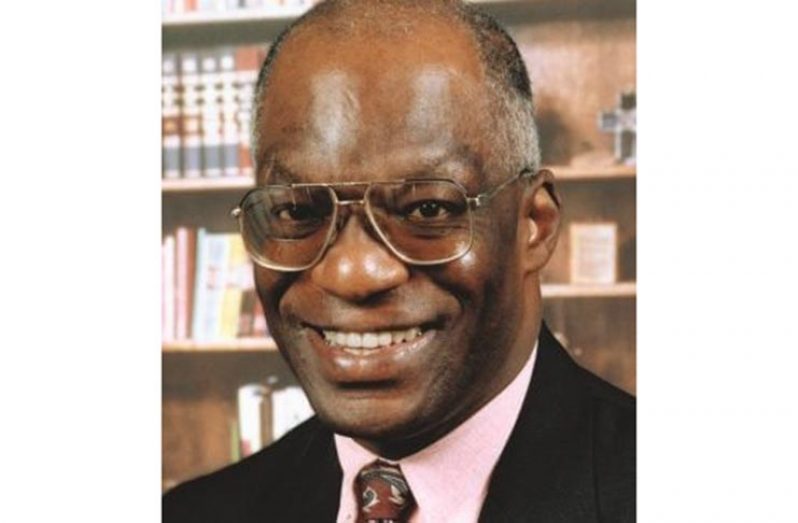…Dr. Francis Alexis, QC says PPP/C’s appeal at CCJ has no real prospect of success
…asserted that Guyana’s constitutional provisions ought not be overruled
…says Constitution, Elections Laws clearly provide for valid votes
By Svetlana Marshall
GRENADIAN Queen Counsel, Dr. Francis Alexis – the Caribbean’s leading authority on constitutional law – said not only was the Court of Appeal right in ruling that Guyana’s President ought to be elected based on valid votes in accordance with the Constitution and Electoral Laws of the country, but there can be no challenge to that decision, even at the level of the Caribbean Court of Justice (CCJ). To do so, would be to overrule the constitutional provisions provided for in Articles 177 (4) AND 162 (1) (b) of the Constitution. On that basis, he said the application filed by the People’s Progressive Party/Civic (PPP/C) for special leave to appeal the decision of the Court of Appeal should not be granted.
The PPP/C last Tuesday (June 23) applied to the Caribbean Court of Justice (CCJ) for special leave to appeal a decision of the Court of Appeal to interpret the words of Article 177 (2) (b) to mean “more valid votes are cast” in determining the President following an Election.
Dr. Alexis – the author of Changing Caribbean Constitutions – in offering his legal opinion on the ‘Jurisdiction relating to Article 177 (4) of the Constitution of the Co-operative Republic of Guyana,’ said Article 177 (4), undoubtedly, gives the Court of Appeal ‘exclusive jurisdiction’ to hear and determine any question relating to the validity of an election of a President based on two limbs – qualification of any person for election or interpretation of the Constitution.
As indicated by the Court of Appeal, in its majority decision in the case – Eslyn David v the Chief Elections Officer and others, Dr. Alexis said those two limbs have to be read disjunctively and not conjunctively. “The Court of Appeal therefore properly decided that it had jurisdiction to entertain the application by David,” the Queen Counsel said.
He said not only was the Court of Appeal correct in establishing jurisdiction but also in its interpretation of the Constitution. Dr. Alexis submitted that both the Constitution and the Representation of the People Act provide for election of a President based on valid votes.
“The mantra of Article 162(1) (b) of the Constitution and its constitutionalising the ROPA (Representation of the People Act) whose section 96(1) requires that there be calculated ‘valid votes’ is that a person be elected as the President on the basis of only valid votes,” the Constitutional Queen Counsel said while iterating that the Court of Appeal was absolutely correct in interpreting ‘more votes’ in Article 177(2)(b) as meaning ‘more valid votes.’
Article 177(4) makes the decision on the interpretation of 177(2)(b) of the Constitution ‘final.’
“A final appellate court, as is the CCJ, undoubtedly has a wide inherent jurisdiction to grant special leave to appeal to it. But such a court does not grant such leave when doing so would overrule constitutional provisions. Granting such special leave in this case would involve CCJ in overruling both Article 177(4) of the Constitution which makes the ruling of the Court of Appeal ‘final’ and Article 162(1)(b) of the Constitution constitutionalising the command in section 96(1) of ROPA that what is calculated is the total number of ‘valid votes’. CCJ should not thus overrule both those provisions of the Constitution,” Dr. Alexis reasoned.
He said from all indication, the appellants – PPP/C’s General Secretary Bharrat Jagdeo and Presidential Candidate, Irfaan Ali – have no reasonable, real prospect of success in an appeal, on the basis that the decision of the Court of Appeal is final, and based on the undeniable fact that Article 162 (1) (b) of the Constitution and the Representation of the People Act mandate a calculation of valid votes. The application for special leave to appeal, he said, should therefore be refused.
“Coming out of the process, GECOM ordered a national recount of all the ballots cast in the election. That recount has been held. The report of the Chief Elections Officer to GECOM on that recount affords a proper formula for calculating the valid votes cast at the election, and so enabling the declaring of a President and members of the National Assembly,” he said.
The case filed by Jagdeo and Ali will come up before the CCJ on July 1, 2020 before a panel of judges led by President of the CCJ, Justice Adrian Saunders. The court has agreed to accept written and oral submissions on the issue of jurisdiction, the application for special leave and on the substantive matter simultaneously. It will, however, make a determination on the issue of its jurisdiction before ruling on any other matter.




.png)









